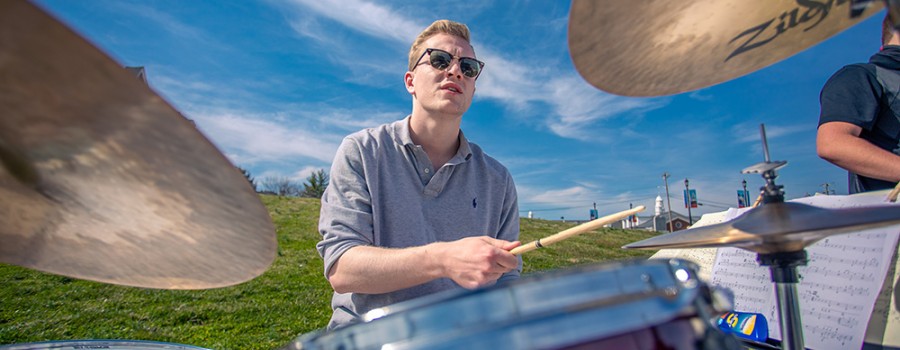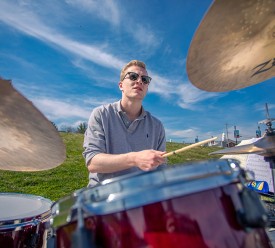Music expresses emotion in ways that words never could.
Has God given you a gift for music? Cultivate it as a music degree major at University of the Cumberlands. Our bachelor's degree in music program is designed to help you understand musical concepts, acquire musical skills, and develop a passion for the art of music. Outstanding musical professionals will guide you as you develop your talents and will provide insight into future career paths you can pursue with your music degree.
By the Numbers
Programs & Requirements
* The credit hours listed on this page only reference the specific program requirements and is not reflective of the total hours necessary to receive your degree. Cumberlands requires all students obtain a minimum of 60 hours for an associate’s degree and a total of 120 hours for a bachelor’s degree. Transfer and prior learning credits may be counted toward those totals.
To learn more about our General Education Requirements, please visit the page referenced below or explore our Academic Catalog.
Bachelor of Science in Music
The bachelor's of music degree program at University of the Cumberlands provides you with many resources to help you get the best music education. Music majors and minors have access to nine studios, a rehearsal hall, sixteen practice rooms, an electric piano lab, a computer-assisted instruction laboratory, and music education classrooms. The classrooms include various teaching series and are equipped with multiple Orff instruments.
Our undergraduate degree in music classes let students learn a variety of musical styles and instruments. Among other classes, the bachelor's degree in music program offers courses in music theory, music history, piano, conducting, music score, world music, music industry and 20th century music. You can join a variety of musical ensembles to practice your skills and get more comfortable performing in front of audiences. After all, music is meant to be shared.
Course Requirements
- MUSC 131 - Music Theory and Skills I
- MUSC 132 - Music Theory and Skills II
- MUSC 231 - Music Theory and Skills III
- MUSC 232 - Music Theory and Skills IV
- MUSC 333 - Music History I
- MUSC 334 - Music History II
- MUPR 109-119
- MUPR 117 - Class Piano I
- MUPR 118 - Class Piano II
- MUSC 423 - Form and Analysis
- MUSC 424 - Twentieth-Century Music
- MUSC 312 - Basic Conducting
- MUSC 401 - World Music
- MUED 425 - Music Core Seminar
- Choose 6 Credit Hours of Ensembles as outlined in the emphasis requirements Music, B.S., B.A. Emphasis Requirements
All students pursuing a major in music must present a senior recital on his/her primary instrument during his/her senior year. Candidates for the church music minor an the applied music minor are also required to present a senior recital.
Piano Emphasis Requirements
- MUPR 221 - Piano Pedagogy
- MUAP 021 - Applied Piano
- MUAP 121 - Applied Piano
- MUAP 221 - Applied Piano
- MUAP 321 - Applied Piano
- MUAP 421 - Applied Piano
- MUAM 499 - Senior Recital
Choose 6 Credit Hours from the following:
Notes:
Students are expected to take Applied Piano until the completion of MUAM 499 Senior Recital. Each section of Applied Piano is repeatable.
Guitar Emphasis Requirements
- MUAG 021 - Applied Guitar
- MUAG 121 - Applied Guitar
- MUAG 221 - Applied Guitar
- MUAG 321 - Applied Guitar
- MUAG 421 - Applied Guitar
- MUAM 499 - Senior Recital
Choose 6 Credit Hours from the following:
Notes:
Students are expected to take Applied Guitar until the completion of MUAM 499 Senior Recital. Each section of Applied Guitar is repeatable.
Instrumental Emphasis Requirements
- MUAI 021-029 (Depending on Instrument)
- MUAI 121-129
- MUAI 221-229
- MUAI 321-329
- MUAI 421-429
- MUAM 499 - Senior Recital
- MUPR 114 - Marching Band *Each Fall semester until Completion of MUAM 499
- MUPR 115 - Concert Band *Each Spring semester until Completion of MUAM 499
Notes:
Students are expected to take Applied Instrument until the completion of MUAM 499 Senior Recital. Each section of Applied Instrument is repeatable.
Vocal Emphasis Requirements
- MUPR 121 - Class Voice and Diction
- MUAV 011 - Applied Voice
- MUAV 121 - Applied Voice
- MUAV 221 - Applied Voice
- MUAV 321 - Applied Voice
- MUAV 421 - Applied Voice
- MUAM 499 - Senior Recital
- MUPR 110 - Chorale *Every Semester until the completion of MUAM 499 Senior Recital.
Notes:
Students are expected to take Applied Voice until the completion of MUAM 499 Senior Recital. Each section of Applied Voice is repeatable.
A Bachelor of Arts degree requires completing the same courses as a Bachelor of Science with the addition of completing one foreign language sequence through the intermediate level.
- FREN 131 Elementary French I
- FREN 132 Elementary French II
- FREN 231 Intermediate French I
- FREN 232 Intermediate French II
- SPAN 131 Elementary Spanish I
- SPAN 132 Elementary Spanish II
- SPAN 231 Intermediate Spanish I
- SPAN 232 Intermediate Spanish II
Bachelor of Music (P-12) Education
Strengthen your musical skills while getting trained in the world of education, learning everything from developing lesson plans to managing classroom behavior. Both music and teaching are forms of art in their own right. Master both of them through a Bachelor of Music.
Course Requirements
- MUPR 117 - Class Piano I
- MUPR 118 - Class Piano II
- MUSC 131 - Music Theory and Skills I
- MUSC 132 - Music Theory and Skills II
- MUSC 231 - Music Theory and Skills III
- MUSC 232 - Music Theory and Skills IV
- MUSC 312 - Basic Conducting
- MUSC 313 - Advanced Conducting
- MUED 324 - Teaching Music in the Elementary School
- MUSC 333 - Music History I
- MUSC 334 - Music History II
- MUSC 401 - World Music
- MUSC 422 - Arranging
- MUSC 423 - Form and Analysis
- MUSC 424 - Twentieth-Century Music
- MUED 425 - Music Core Seminar
- Choose 6 Credit Hours of Ensembles outlined in the Music Education (P-12), B.M. Emphasis Requirements
** 42 Credit Hours in professional education
- Music Education majors should take MUED 130 as a substitution in professional education and/or general education requirements.
- Music majors must achieve a grade of “C” or higher in prerequisite courses.
- Transfer students may have the pattern of prerequisites altered at the discretion of the Department Chair.
- Voice majors must take MUPR 121 - Class Voice and Diction
- Piano majors will substitute MUPR 221 - Piano Pedagogy for MUPR 117 - Class Piano I and MUPR 118 - Class Piano II
- All Music Education majors: All candidates pursuing the Bachelor of Music degree in Music Education MUST be accepted into the Teacher Education program before they will be allowed to register for EDUC 432 - Fundamentals of Secondary Education or ELEM 430, Classroom Management and Behavior.
Music Minor
You don't have to give up your love for music just because you're starting college. A music minor allows you to combine your major with your passion for music. You'll learn more about the fundamentals of music while receiving coaching for your instrument, all while still having the time to pursue a different major.
Course Requirements
- MUSC 131 - Music Theory and Skills I
- MUSC 132 - Music Theory and Skills II
- MUSC 333 - Music History I
- MUPR 117 - Class Piano I
- MUPR 118 - Class Piano II
- MUSC 334 - Music History II
- MUSC 401 - World Music
- MUPR 121 - Class Voice and Diction (All vocal music minors must also take this course)
In addition, four semesters participating in a campus ensemble. You are encouraged to participate in the major ensemble that showcases your primary instrument.
A Music Therapy pathway for Music and Psychology students who plan to eventually pursue a graduate degree in Music Therapy.
- MUPR 121 - Class Voice and Diction
- MUSC 131 - Music Theory and Skills I
- MUSC 132 - Music Theory and Skills II
- MUSC 231 - Music Theory and Skills III
- MUSC 232 - Music Theory and Skills IV
- MUSC 333 - Music History I
- MUSC 334 - Music History II
Additional courses required to complete the Music Therapy Pathway are found below and under the Department of Psychology under the Music Therapy Pathway.
Students pursuing the Music Therapy Pathway should pick one of the emphasis options listed for the B.S / B.A. (B.S./ B.A. Piano Emphasis Requirements, B.S./ B.A. Guitar Emphasis Requirements, B.S./ B.A. Instrumental Emphasis Requirements or B.S. / B.A. Vocal Emphasis)
All students, regardless of emphasis, should take MUPR 121 - Class Voice and Diction. Students choosing a vocal emphasis should take this class in their first semester of music study.
Students with limited vocal training may be encouraged to complete additional study in Applied Voice in order to develop a stronger singing voice.
All students, regardless of emphasis, should take MUPR 219 - Guitar Techniques.
Additional study in Applied Guitar is required for two semesters. It is recommended that study focus on chording including I, IV and V7 chords in four major and four minor keys as well as common simple tunes (pop, country, folk, gospel, children’s songs, etc.) from various decades.
Music majors must achieve a grade of “C” or higher in prerequisite courses.
Transfer students may have the pattern of prerequisites altered at the discretion of the Department Chair Students with a piano emphasis will substitute MUPR 221 - Piano Pedagogy for MUPR 117 - Class Piano I and MUPR 118 - Class Piano II.
The following classes are also recommended from the Department of Biology for the Music Therapy Pathway:
Music Performance Scholarships
Music Scholarships are available to students who plan to participate in music ensembles at UC. An audition is required to apply for a scholarship.
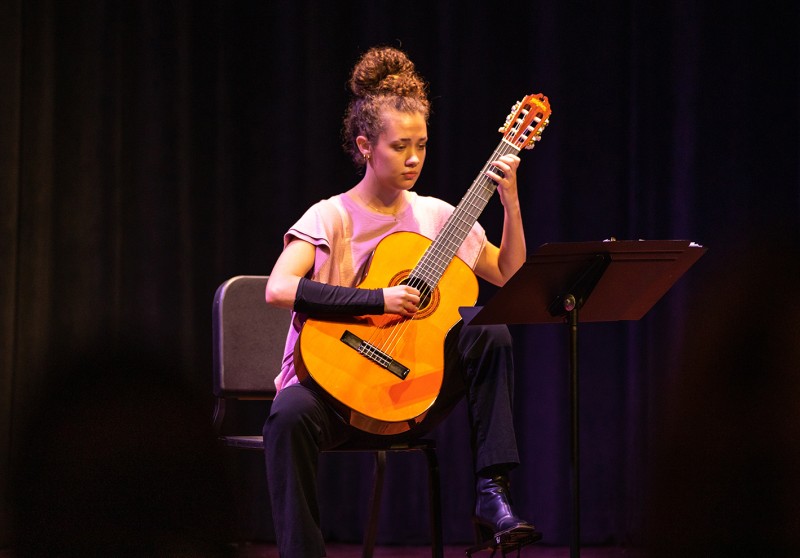
Take the Next Step
Mission & Goals
The mission of the Department of Music is to provide music majors like you with opportunities to grow in understanding of musical concepts, acquire musical skills, and develop aesthetic values, all in preparation for a successful career in music.
Learn the fundamental knowledge and understanding of Western music.
Recognize relationships between the various disciplines within music.
Grasp the basic concepts and skills concerning the emphasis area of music education.
Develop your musical performing skills.
Understand the basics of music theory and composition.
Music Careers & Outcomes
All stats from U.S. Bureau of Labor Statistics
Instrumentalist/Singer: $30/hr
Instrumentalist/Singer: $30/hr
Showcasing your musical talents through performances in settings such as live performances, entertainment venues, weddings, ceremonies, etc.
Music Director/Composer: $49,130
Music Director/Composer: $49,130
Lead and direct performers in musical groups, and write and arrange sheet music.
Dancer/Choreographer: $19/hr
Dancer/Choreographer: $19/hr
Make original choreography for musical performances and direct dancers.
Music Professor: $93,440
Music Professor: $93,440
Teaching students music concepts, skills, and performance skills at the college level.
Music Tutor: $44,820
Music Tutor: $44,820
Tutor students in developing their musical skills, such as vocal lessons or instrumental lessons.
High School Teacher: $61,820
High School Teacher: $61,820
Teaching students music concepts and performance skills at the high school level.
Choral Ensembles
Students can audition for these ensembles and earn performance scholarships as well as course credit.
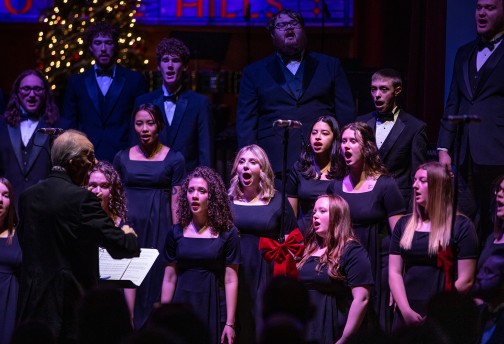
Cumberland Voices
Cumberland Voices is our chamber choir (MUPR 111) including an auditioned ensemble of 14-16 singers.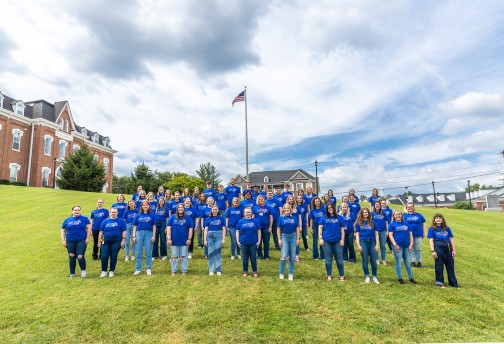
Chorale
Chorale (MUPR 110) is considered the primary large choral ensemble and is open to all students on campus.Bands
Students can audition for these ensembles and earn performance scholarships as well as course credit.

Marching Band
The Marching Band (MUPR 114) is the most visible part of the music program and is made up of students from all majors on campus.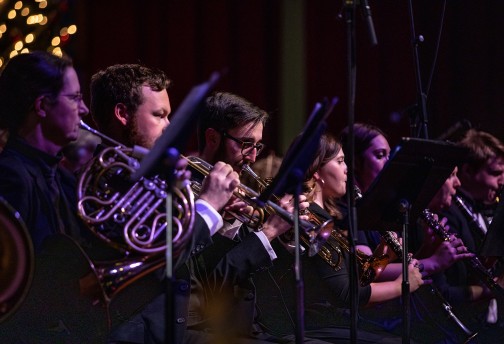
Concert Band
Concert Band (MUPR 115) performs concerts during the spring semester and is open to all students, faculty and community members.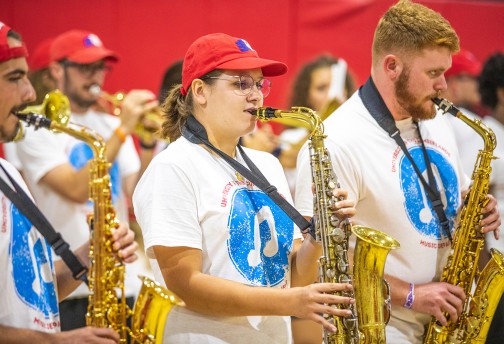
Pep Band
The Pep Band (MUPR 119) is the primary athletic band for the spring semester.Additional Ensembles
Students can audition for these ensembles and earn performance scholarships as well as course credit.
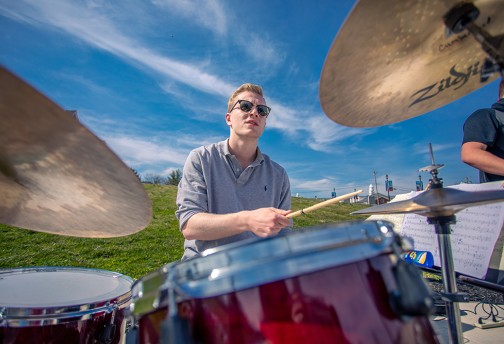
Percussion Ensemble
The Percussion Ensemble (MUPR 109) is designed to give the percussionist an intensive playing experience.
Jazz Ensemble
Jazz Ensemble (MUPR 116) performs music from a variety of styles including swing, funk, latin, ballads, bebop and fusion.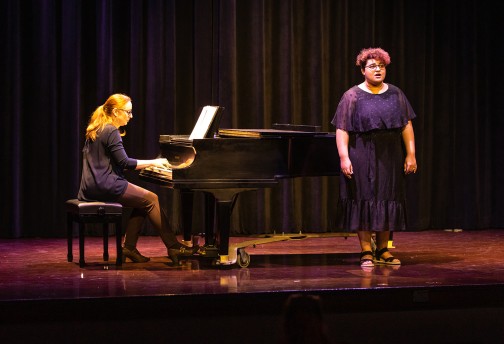
Chamber Ensembles
In addition to large ensembles, UC offers various smaller chamber ensembles for student participation.Common Questions for the Music Program
Many ensembles require you to audition to join them. To get connected, you can send an email to the instructor that is over that ensemble and let them know that you are interested in joining. You also may be able to find posted audition dates. Note: You do NOT have to be a music major or minor to participate in musical ensembles; everyone is welcome to audition!
Yes! University of the Cumberlands offers music scholarships. For more information, call the Department of Music at 606.539.4332 or email music [at] ucumberlands.edu (music[at]ucumberlands[dot]edu.)
You can learn more about this and other scholarship opportunities on our scholarship page.
Absolutely. Some of your emphasis options are piano, guitar, instrumental, and vocal. You may also choose an education-related emphasis.
The music department puts on many live concerts throughout the year with each ensemble, so you will be performing live if you are part of an ensemble. The ensembles also do joint concerts with other schools and perform at UC events such as Christmas at the Cumberlands. Sometimes, ensembles even perform with professional guests.
A music degree focuses on developing fundamental skills in music theory, performance, and composition. At University of the Cumberlands, this program encompasses a comprehensive understanding of musical concepts, performance skills, and the history of various musical genres.
The Bachelor of Music degree typically requires around 42 credit hours specific to music, though students must complete a total of 120 credit hours for graduation. The duration generally aligns with a standard four-year undergraduate program.
The music degree program at University of the Cumberlands is offered on-campus. While some courses or components might be available online, the core curriculum and performance requirements are primarily on-campus to ensure hands-on experience and ensemble participation.
Yes, a music degree is worth it for those passionate about music and aiming for a career in this field. With career options ranging from music performance to teaching and composing, and an average salary of $30 per hour for instrumentalists and singers, a music degree can be both fulfilling and financially rewarding.
Graduates with a music degree can pursue various careers such as instrumentalists or singers, music directors or composers, music professors, music tutors, and high school music teachers. Other opportunities include roles in music therapy, dance choreography, and various ensemble performances.
To obtain a music degree from University of the Cumberlands, you must complete the required coursework totaling 120 credit hours, including 42 credits specific to music. This involves both theoretical and practical components, including performance in ensembles and potentially participating in music scholarships and auditions.
The Bachelor of Music degree is typically the best choice for those pursuing a professional career in music. It provides in-depth training in music theory, performance, and composition, and prepares students for advanced study or careers in music-related fields.
At University of the Cumberlands, the music degree offered is a Bachelor of Music (BM), not a Bachelor of Arts (BA). The BM focuses more intensely on music-specific courses and performance.
Yes, a music degree is useful for individuals aiming to build a career in music. It provides essential skills in music theory, performance, and composition, and can lead to various professional opportunities in education, performance, and music industry roles.
A music major can be challenging due to its demanding coursework in music theory, performance, and composition. It requires strong dedication, practice, and skill development, but for those passionate about music, the challenges are often rewarding.
To become a music teacher, you typically need a Bachelor of Music degree or a related field with a focus on music education. This degree prepares you for teaching music concepts and performance skills at various educational levels, from elementary to high school.
Music News
Learn more about what's happening with our Fine Arts programs.
Our Music Department Faculty
Learn more about the music professors here at Cumberlands.

Dr. Tara Warfield

Dr. Duane Warfield
Dr. Duane Warfield
Contact Information
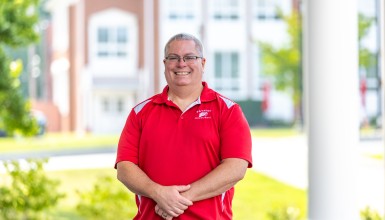
James R. Corcoran
James R. Corcoran
Contact Information
Request Information
Want to know more about Cumberlands? Ask away!
